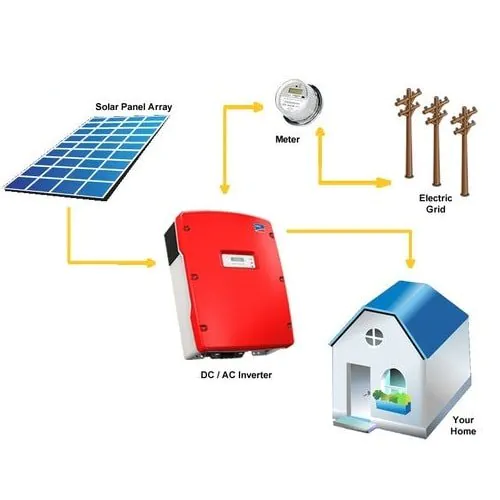Affordable Solar System Panels for Home
A residential solar power system uses the Sun's plentiful energy to generate electricity. It offers homeowners a clean, sustainable energy alternative while decreasing their dependency on traditional grid-based electricity. In this section, we will look at the components, benefits, and considerations of a residential solar power system.
.webp)
Benefits of a Solar Power System for Home
-
Energy Cost Savings: By generating their own electricity, homeowners can significantly reduce their reliance on the grid and lower their energy bills. Solar power systems provide a long-term investment with a strong return on investment (ROI) through energy cost savings.
-
Clean and Renewable Energy: Solar power is a clean and renewable energy source that produces no greenhouse gas emissions or air pollutants during operation. By using solar energy, homeowners contribute to a healthier environment and help combat climate change.
-
Increased Property Value: Homes equipped with solar power systems often have increased property values. Solar installations are seen as desirable features, and potential homebuyers are attracted to the idea of lower energy costs and environmental sustainability.
-
Energy Independence: A solar power system for home provides a degree of energy independence. Homeowners are less affected by utility rate increases and have a reliable source of electricity even during grid outages.
On Grid Home Solar System Price List
| Solar System Model | Selling Price |
|---|---|
| 1 kW on grid solar system | Rs. 80,000 |
| 2 kW on grid solar system | Rs. 1,50,000 |
| 3 kW on grid solar system | Rs. 2,10,000 |
| 5 kW on grid solar system | Rs.3,00,000 |
| 10 kW on grid solar system | Rs. 5,00,000 |
On Grid Home Solar System
This is the most prevalent sort of solar power system seen in today's homes. On-grid solar systems are also known as grid-tied solar systems or connected solar systems. It is a hybrid of solar panels and the grid (government electricity).

Components of a Solar Power System for Home
-
Solar Panels: The solar panels, or photovoltaic (PV) panels, are the heart of a residential solar power system. These panels contain multiple solar cells that convert sunlight into direct current (DC) electricity.
-
Inverter: The DC electricity produced by the solar panels needs to be converted into alternating current (AC) electricity used in homes. An inverter performs this conversion, making the electricity compatible with standard household appliances and electronics.
-
Racking and Mounting: Racking and mounting systems securely hold the solar panels in place, whether they are installed on the roof, on the ground, or as a solar canopy.
-
Balance of System (BOS): The balance of the system includes components such as wiring, disconnect switches, circuit breakers, and meters. These components ensure the safe and efficient operation of the solar power system.
-
Net Metering and Grid Connection: A residential solar power system remains connected to the electrical grid. Excess electricity generated by the system can be fed back into the grid, earning credits or compensation through net metering programs.
Considerations for Installing a Solar Power System for Home
-
Solar Potential: Assessing the solar potential of the home is crucial. Factors such as roof orientation, tilt, shading from trees or nearby structures, and local climate conditions should be considered to ensure optimal solar generation.
-
System Sizing: Determining the appropriate size of the solar power system involves evaluating energy consumption patterns, available roof space, and budget. An experienced solar installer can assist in designing the system based on individual needs.
-
Local Regulations and Incentives: Understanding local regulations, building codes, and incentives for solar installations is essential. Homeowners should research and take advantage of incentives such as tax credits, rebates, and net metering programs.
-
Professional Installation: Working with a reputable solar installer is recommended to ensure proper system design, installation, and compliance with local regulations. Professional installers have the expertise to optimize system performance and ensure safety.
